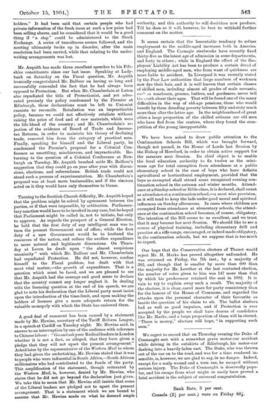Turning to the Scottish Church difficulty, Mr. Asquith hoped that
the problem might be solved by agreement between the parties, or if that were impossible, by arbitration. Parliamen- tary sanction would have to be invoked in any case, but he hoped that Parliament might be called in, not to initiate, but only to approve. As regards the prospect of a General Election, he held that the first duty of any intelligent man was to turn the present Government out of office; while the first duty of a new Government would be to husband the resources of the nation, and reduce the swollen expenditure to more natural and legitimate dimensions. On Thurs- day at Leven he dwelt upon "the almost suspicious unanimity" with which Mr. Balfour and Mr. Chamberlain had repudiated Protection. He did not, however, confine himself to the Fiscal problem, but dealt with that most vital matter,—the growth of expenditure. That is a question which must be faced, and we are pleased to see that Mr. Asquith had the courage and good sense to declare that the country cannot any longer neglect it. In dealing with the licensing question at the end of his speech, we are glad to note his declaration that the Liberal party must insist upon the introduction of the time-limit, and upon making the holders of licenses give a more adequate return for the valuable monopoly with which the State has endowed them.










































 Previous page
Previous page